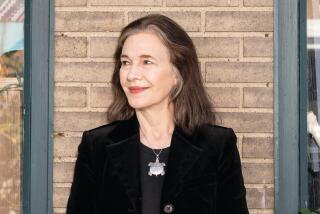BOOK REVIEW / FICTION : A Glimpse of Real Life and Family Ties : LOVING EDITH, <i> by Mary Tannen</i> , Riverhead Books, $22.95; 275 pages
- Share via
Last Christmas, I got martini glasses, decorated with hand-painted cherries, from my brother’s wife. Reading this book is like that: Drinking a whimsical cocktail.
The improbable story is set in New York, where it unfolds like a very pleasing urban fairy tale. A young girl, named Edith--beautiful, of course, and smart--comes down from Upstate New York to take a job at a literary magazine in the city. She and her best friend Clarence refer to their coming summer in New York as “Real Life,” to distinguish it from the faux life of the college they attend.
Edith’s friend is gay and doesn’t feel especially comfortable at Grimsby College. Neither does Edith, who yearns for a more sophisticated, cosmopolitan life, some life where she can eat something other than hamburgers and french fries (her mother’s staple) for dinner. Part of Edith’s curiosity about the larger world may have to do with her own history.
Edith is adopted. Her doting, adopted grandfather suggests that while she’s in New York, she look up her biological mother, Lucille Arslanian. That’s all grandpa gives Edith--the name of the mysterious lost mother. The two have never met as adults. Eager to meet her daughter though anxious at the prospect, Edith’s mother, nicknamed Lulu, arranges by mail with Edith’s grandfather for Edith and Clarence to get a summer sublet in a Soho loft rent-free. Lulu will live in the same building and orchestrate a meeting with her daughter when she feels it is time.
Lulu is concerned that Edith will disapprove of her, for as a California flower child, living with friends in a New York commune, she had brought her sick baby in to see the local doctor. It was he, grandpa, who persuaded the broke, desperate girl, to give up her child. The doctor’s own daughter, Carolyn, would adopt her. When Edith reached 21, the doctor and Lulu agreed, he would let Edith know her real mother’s name and address.
That time, to Lulu’s amazement, has come. When Lulu is honest with herself, she thinks it’s extremely unlikely that she would have provided a good, stable home for a daughter whom she had first named Desiree, then Desert Ray. The doctor, she thinks, is clearly more stable than she, the freewheeling flamboyant artist.
At first, you think the only thing Lulu and Edith have in common is their hair: curly, wild and red. Edith keeps hers neatly coiffed in a braid; Lulu tends to wear hers loose or pulled back in a bushy ponytail sticking out from under a baseball cap. When the two first encounter one another by accident at a Soho cafe, Edith doesn’t like her. She finds her loud and wild, somewhat tacky, perhaps a bohemian leech, who, as Edith discovers, unfortunately lives in the same building as she.
*
Edith’s own life seems to be progressing in an orderly fashion. In the spring of her junior year, she wrote to the editor of Ubu, a literary magazine she had often read while helping out in her grandfather’s clinic. In the letter, she asks an editor named Geraldine McGarry for an internship interview. When they meet, McGarry, the urbane, gray-eyed editor, hires Edith on the spot. Edith doesn’t suspect her new mentor’s motive. McGarry had been in love with Henry, Ubu’s now ailing editor. Edith reminds McGarry of Henry. For good reason, she suspects Edith might be Henry’s child.
Twenty-one years ago, Lulu had worked at Ubu. She’d had an affair with Henry and told Geraldine and Florence, another editor. They lent her money for an abortion. But instead of aborting the baby, Lulu went to an Upstate New York commune to have the child. That’s where, broke and distraught, she handed her baby girl over to the kindly, elderly doctor.
How Edith’s entrance into the world of all these people--Henry, McGarry, Florence and Lulu--changes them and her, is the nub of the book. It shows, in good, fictional fashion, how feelings don’t necessarily change or even die. Twenty years later, the same passions surrounding Lulu come circling around her foundling child. In dealing with them, Edith discovers how she resembles and differs from her mother. To paraphrase Eudora Welty, emotions don’t grow old, nor does the heart.
More to Read
Sign up for our Book Club newsletter
Get the latest news, events and more from the Los Angeles Times Book Club, and help us get L.A. reading and talking.
You may occasionally receive promotional content from the Los Angeles Times.










